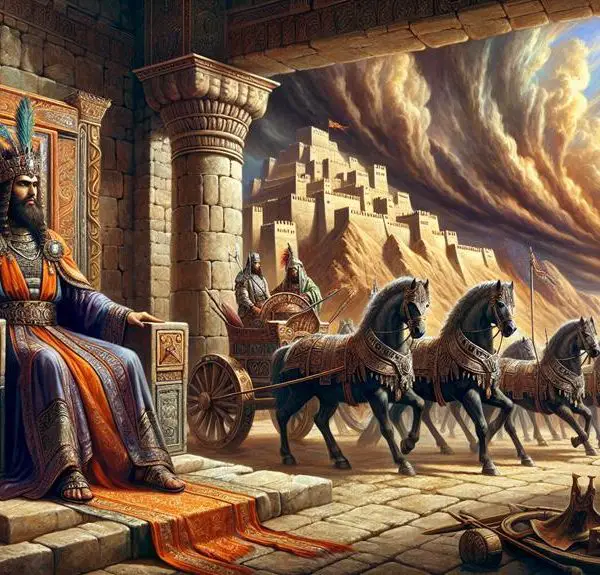Discover the captivating stories behind Biblical girl names starting with 'J,' revealing timeless lessons of courage and faith.

J Names in the Bible Girl
You've probably heard that names carry significant meaning, but have you ever explored the stories behind the 'J' names of women in the Bible?
From Jael's fearless encounter to Judith's act of bravery, these narratives are not just historical accounts but lessons in courage and faith.
Joanna's devotion and the significance of names like Jemima and Jerusha offer a deeper insight into the cultural and spiritual context of their times.
Each story is a thread in the rich tapestry of biblical history, inviting you to uncover the layers of meaning and inspiration they hold for today's world.
Why stop here when there's so much more to uncover about these remarkable women and their enduring legacy?
Key Takeaways
- Jael and Judith exemplify bravery and resourcefulness among biblical women with J names.
- Joanna highlights the significant roles women played in Jesus' ministry and early Christian communities.
- Jemima represents themes of restoration and hope in biblical narratives, emphasizing women's roles in conveying redemption.
- Jerusha's role as a mother in the royal lineage underscores the importance of women in inheriting and passing on faith traditions.
The Story of Jael

In the narrative of the Hebrew Bible, Jael emerges as a pivotal figure whose actions significantly impact the course of Israelite history. Through her cunning and decisiveness, she employs a strategy that not only demonstrates her resourcefulness but also alters the trajectory of a conflict pivotal to the Israelites. Jael's strategy involves the use of her domestic space as a battlefield, a move that subverts traditional expectations of women's roles and the sanctity of hospitality.
The significance of the tent peg in Jael's story can't be overstated. In a society where men typically wielded swords and spears, Jael's choice of a tent peg as her weapon imbues the narrative with a rich layer of symbolism. This everyday object, integral to the stability of her home, transforms under Jael's hand into an instrument of divine justice. It not only emphasizes the unexpected nature of her victory but also highlights the theme of the divine working through the most unlikely means and individuals. By examining Jael's strategy and the symbolic weight of the tent peg, one gains a deeper understanding of her role in the biblical text and the broader themes it explores.
Judith's Act of Bravery

Judith's act of bravery, marked by her daring assassination of Holofernes, showcases a profound moment of divine intervention and human courage within biblical narratives. This act isn't merely a tale of valor but an emblem of ancient heroism, where faith and strategic cunning converge.
Judith, a widow, uses her wit and beauty as weapons against the oppressor of her people, leading to Holofernes' downfall. Her journey to the enemy camp, under the guise of defection, and the subsequent beheading of Holofernes, is a testament to her incredible audacity and deep faith.
This narrative, rich in symbolism, underscores the power of belief and the role of individuals in shaping their destiny and that of their communities. Judith's victory isn't just a personal triumph but a collective salvation for her people, illustrating the impact of individual actions on the broader societal canvas.
Her story, embedded within the tapestry of biblical tales, continues to inspire as a beacon of ancient heroism, demonstrating the enduring appeal of stories where faith, courage, and intelligence triumph over seemingly insurmountable odds.
Joanna, Follower of Jesus

Among the followers of Jesus, Joanna stands out as a figure whose support and devotion played a critical role in his ministry, emphasizing the diverse composition of his early adherents. Her narrative offers a nuanced perspective on women's roles in the nascent Christian community, reflecting broader themes of inclusion and support that were foundational to its growth. Joanna's generosity, in particular, underscores the essential, though often underappreciated, contributions of women to the movement.
To understand Joanna's impact more fully, consider these aspects:
- Background and Status: Joanna was married to Chuza, the manager of Herod's household. This connection suggests she was of considerable social standing, which could have facilitated her substantial support for Jesus and his followers.
- Support for Jesus' Ministry: The Gospel of Luke mentions Joanna's financial contributions to Jesus' ministry. Her generosity highlights the pivotal role women played in sustaining the movement, both materially and spiritually.
- Witness to the Resurrection: Joanna is listed among the women who discovered the empty tomb, affirming her steadfast faith and the critical role of women as the first witnesses to one of Christianity's cornerstone events.
Joanna's story, therefore, illuminates the indispensable contributions of women in the early Christian community, challenging traditional narratives and emphasizing a more inclusive understanding of leadership and support.
The Significance of Jemima

Moving from Joanna's substantial contributions to the early Christian community, we now explore the narrative of Jemima, another biblical figure whose story offers profound insights into the nuanced portrayals of women in religious texts. Jemima, one of Job's three daughters, emerges in a context of restoration and reward, her very existence symbolizing the restoration of Job's fortunes. In analyzing Jemima's symbolism, it's crucial to recognize her as a representation of prosperity and divine blessing.
Her name, evocative of beauty and brightness, mirrors the shift from despair to hope in her father's life. Jemima's story isn't just an account of personal restoration but also a broader commentary on the role of women in conveying themes of redemption and renewal. Unlike many of her contemporaries, Jemima is mentioned by name, underscoring her significance within the text.
Her narrative, though concise, is rich with layers of meaning. Jemima embodies the intertwining of loss and recovery, serving as a beacon of prosperity representation in the midst of suffering. Her story encourages a deeper examination of the roles attributed to women in biblical narratives, highlighting their pivotal contributions to themes of resilience and faith.
Exploring the Name Jerusha

Delving into the significance of the name Jerusha, we uncover a less commonly discussed yet pivotal character in biblical narratives, whose name embodies themes of inheritance and legacy. This exploration not only reveals the historical and cultural context of Jerusha's lineage but also offers insights into the profound meaning encapsulated within her name.
To paint a clearer picture:
- Jerusha's Lineage: She's identified as the mother of King Jotham, implying her role within the royal lineage of Judah. Her position underscores the importance of maternal figures in biblical genealogies, highlighting how they contribute to the continuation and shaping of legacy.
- Name Interpretation: The name Jerusha translates to 'her possession' or 'inheritance,' which is symbolic of the legacy and blessings passed down through generations. This interpretation not only reflects her status within the narrative but also emphasizes the biblical theme of inheritance—both material and spiritual.
- Cultural Context: Understanding Jerusha within her cultural and historical setting enriches our comprehension of her role. It presents a nuanced view of women's positions in biblical times, illustrating how they were integral to the perpetuation of lineage and faith traditions despite the patriarchal society.
Through this analytical lens, Jerusha's narrative becomes a testament to the enduring themes of inheritance and the pivotal role of women in biblical histories.
Frequently Asked Questions
What Are the Less Commonly Known Traits or Hobbies of Biblical Girls With Names Starting With J?
You're delving into rare qualities and pastimes of biblical females, specifically those whose names start with 'J.' Jewish naming ceremonies often honored these women, highlighting their unique contributions beyond their immediate stories.
Analyzing these figures, one discovers their influence on Ancient Hebrew fashion and community roles.
While well-known for their faith and courage, their artistic expressions, possibly in weaving or embroidery, showcase a blend of spirituality and creativity, reflecting their multifaceted identities.
How Have Names Starting With J From the Bible Influenced Modern Naming Trends in Various Cultures?
You're witnessing a wave of J name popularity trends sweeping through societies, showcasing the significant influence of biblical names on modern naming conventions.
This cultural adaptation of J names reflects a deep-rooted reverence and connection to biblical narratives, translating ancient traditions into contemporary contexts.
Analyzing these patterns reveals a fascinating interplay between historical significance and modern identity, where ancient names, once etched in sacred texts, now adorn the identities of individuals across diverse cultures.
Are There Any Biblical Girls' Names Starting With J That Have Been Associated With Specific Miracles or Supernatural Events?
You're exploring names that carry not just cultural weight but also divine associations. Specifically, you're curious about biblical names beginning with 'J' linked to miracles or supernatural events.
Jael's bravery and Judith's wisdom stand out. These names aren't just identifiers; they're symbols of divine intervention and human courage.
Analyzing their stories offers a nuanced understanding of how faith and personal strength intertwine, shaping perceptions and traditions surrounding these powerful biblical figures.
How Do the Meanings of the Names of Biblical Girls Starting With J Reflect Their Character or Destiny According to Theological Interpretations?
Imagine unearthing ancient scrolls, each name a key to unlocking profound destinies.
In this scholarly quest, you'll find Jael's Courage not merely a tale of bravery but a reflection of her name's essence, suggesting the impact of divine strength in times of crisis.
Similarly, Joanna's Generosity goes beyond mere acts of kindness, embodying a theological interpretation that her name foretold a life marked by benevolence and significant contribution to her community.
What Are Some Contemporary Books or Movies That Feature Characters With Biblical Girls' Names Starting With J, and How Do These Characters Compare to Their Biblical Counterparts?
You're exploring how modern adaptations of characters named after biblical figures beginning with 'J' undergo character development and how these portrayals influence their comparison to their biblical counterparts.
Analyzing these characters involves scrutinizing their actions, decisions, and growth within contemporary books or movies.
This scholarly approach reveals the extent to which modern interpretations align or diverge from theological narratives, offering insights into the adaptability and enduring relevance of these biblical names through time.
Conclusion
In your journey through the tapestry of Biblical narratives, you've encountered heroines whose names begin with 'J,' each thread woven with courage, faith, and resilience.
Jael, Judith, Joanna, Jemima, and Jerusha aren't just letters on a page; they're pillars of strength, defying their era's constraints.
Like stars in the night sky, they guide us with their luminous tales of bravery and devotion.
These narratives, rich in symbolism and depth, invite a closer examination, encouraging us to unearth the layers of meaning beneath their historical and spiritual significance.



Sign up